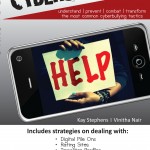This is a guest blog by Kay Stephens of www.CyberSlammed.com from Maine, United States of America.
Contact Kay and Vinitha on their website above and watch Kay being interviewed on TV
Teens, social media and TMI
You’ve all heard the cutesy expression, TMI (Too much information) used in TV sitcoms and online conversations. TMI is usually an admission of some sort that doesn’t need to be said in polite society, or personal information that can be potentially embarrassing. Teenagers using social media have a very real need to be wary of TMI online—even in private closed social communities to their closest friends.
The most recent November, 2012 Pew Internet & American Life Project study on teens and Internet privacy reveals that 69% of parents of online teens are concerned about how their child manages his or her reputation online. What we need to be concerned about is not the number of people teens are restricting access to, it’s the content that cyberbullies are most after.
Whatever teens are posting to their friends (and hundred of acquaintances) is interesting, sure, but to their ex-friends, ex-relationships and to lurking trolls, it is highly interesting. Day-to-day middle and high school conflicts can blow up and change friendship statuses on a dime. TMI, which can be a funny admission to a friend one day, can turn into a potential weapon the next.
One of the first tactics a cyberbully will use involves a complete and thorough Internet search online of the target’s name and any links to salient information the target has either posted about himself/herself or is the subject of. This includes photos, videos, comments on other people’s social networking profiles, admissions, secrets, you name it.
Doxing
It’s called “doxing” an UrbanDictionary term for gathering intel on your online target.
Doxing is a technique of tracing someone or gather information about an individual using sources on the internet. Its name is derived from “Documents” or “Docx”. Doxing method is based purely on the ability of the hacker to recognize valuable information about his target and use this information to his benefit. It is also based around the idea that, “The more you know about your target, the easier it will be to find his or her flaws”
Teenagers need to take charge of their own public image the moment they engage online and add pieces of information to their digital footprint. If they’ve already been online for years, now is the time to start doing some serious content inventory.
This means proactively taking two steps on digital footprint each time:
Self Define: Before posting any content, engage the “It pays to be paranoid” filter. Ask yourself: “Will this post/picture/comment come back to haunt me? Will someone take it the wrong way?”
Self Regulate: In the heat of the moment or when emotions are running high, teens may send and upload information without thinking about their consequences—or how that information might be misconstrued, misperceived or misused.
Here are some tools to review this content all in one place
Using a Google alert (www.google.com/alert) or Social Mention (www.socialmention.com) these tools will scour the ‘Net daily, weekly or monthly and deliver search results on any information online connected to the teenager’s name or other identifying information.
My Mobile Watchdog (www.mymobilewatchdog.com) and Mobile Spy (www.mobile-spy.com) were invented for parents to monitor their children’s cell phone and Internet activity, but these tools can also be used by teens themselves to review logs of every text message they have sent or received, social media activity, websites visited and other potentially embarrassing information. Make it a habit to peruse this information and go back to step one: Self-Define.
While some teenagers will prefer to self-regulate, others may need parents to help them make wise decisions. (We prefer to endorse parental cell phone monitoring software as a set of “training wheels.” We encourage parents to disclose to their teenagers that the software is being used, particularly to younger cell phone users as a way to make good decisions before the “training wheels” come off.)
Parents and educators are constantly asking us, “how do we stop cyberbullying?” and admitting they feel overwhelmed, not knowing where to start. There is not one easy answer as there are so many moving parts to this problem. However, there is always one area teens have control, and that is the messages they choose to reveal or not reveal online. Make it a habit to Self-Define and Self-Regulate and fortify your digital walls against the next potential attack.










Have you heard of things like apprenticeships in the security sector>?
No I have not Paul. Is it something you have come across?